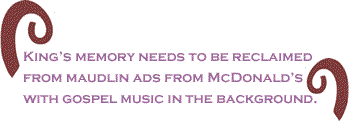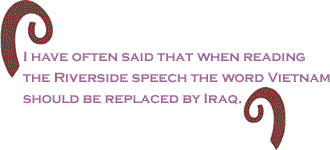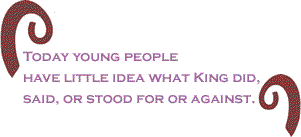
|
|||||||||||||||||||||
|
It may seem strange to write about the celebration of Martin Luther King’s birthday two months in advance. But I do feel that time is of the essence. We can’t wait until January if we are to eradicate the sorry spectacle we have allowed Martin Luther King Day to become. I both anticipate and dread the celebration of Martin Luther King’s birth. I look forward to thinking of his enormous yet still under-valued contribution to the history of America and the world. But I dread hearing that once upon a time a black woman on a bus was too tired to give her seat to a white person, a young minister helped her get a seat, ten years later he gave a speech about a dream, and for some strange reason he was shot and killed by a petty criminal in Memphis a few years later. To add insult to the injury caused by this fractured fairy tale we see children singing songs, and Jennings, Brokaw and Rather asking if The Dream has been realized. The news anchors reel off a series of depressing statistics about black people (income, incarceration rates, life expectancy, etc.) and then conclude that King’s dream is still just that. Another cause of my King Day dread is the sight of politicians descending on black communities like locusts. Here in New York they go from church to church, borough to borough. Usually they quote the lines from the “I Have a Dream” speech which exhort hand holding between people of different races.
But we are at a pivotal moment in history. In 2004 the Iraq war will enter its second year. A president will be elected. Because 2004 will be so important we should begin now, in 2003, to give the day a new direction. It is high time that the “drum majors for justice” reclaim King Day and demand that those who invoke King’s name do so by acting in the spirit he demanded of himself and others. On April 4, 1967, a year to the day before his murder, Martin Luther King spoke at New York’s Riverside Church. The Vietnam War was at its apex, in terms of men at arms, dollars spent, and bombs dropped. King’s decision to speak out against the war was incredibly risky. He risked incurring the wrath of President Johnson, who was seen as a champion of the civil rights movement, and the movement’s liberal allies as well. The liberal establishment showed its true colors after the speech. It is important to note that many who laud King today were hostile to him in his lifetime. In an editorial the New York Times called the speech “King’s Error” and lambasted King for daring to speak about foreign affairs at all. Time magazine called it “…demagogic slander that sounded like a script for Radio Hanoi.” Frightened black leaders and organizations such as the NAACP disassociated themselves from King’s statements against the war. The week before he gave the Riverside speech, King requested that the Board of the organization he headed, the Southern Christian Leadership Conference, make a statement of commitment to oppose Johnson’s policies on Vietnam. They declined to do so. King had stepped into a no man’s land where few were willing to follow.
As we prepare to honor Dr. King in 2004 we must remember his words about the war in Vietnam. Iraq is the Vietnam of our era. I have often said that when reading the Riverside speech the word Vietnam should be replaced by Iraq and the statements made at that time applied to our situation today. Because people in power didn’t listen to King in any serious way we have repeated all that he warned us about 36 years ago. “Increasingly, by choice or by accident, this is the role our nation has taken – the role of those who make peaceful revolution impossible by refusing to give up the privileges and the pleasures that come from the immense profits of overseas investment.” “When machines and computers, profit motives and property rights are considered more important than people, the giant triplets of racism, materialism, and militarism are incapable of being conquered.” “We are adding cynicism to the process of death, for they must know after a short period there that none of the things we claim to be fighting for are really involved.” Because most King Day celebrations take place in churches we should return to our church roots in 2004 and ask the multitude of eager politicos to speak on a particular theme. Black ministers are accustomed to doing that. In 2004 they should request the speakers who inundate their churches to address the issues raised in the Riverside Church speech as they relate to the war in Iraq. The theme should be “A Time to Break the Silence on Iraq.” I would love to see my Governor, Republican George Pataki, cheerleader for George Bush, be forced to defend his support for the war in Iraq. I would also like to see the man who will no doubt run for that office, Democrat Attorney General Eliot Spitzer, who is also in support of the war, speak on King’s anti-war sentiments. Likewise my Senators, Charles Schumer and Hillary Clinton, both of whom voted to authorize the president to attack Iraq and not give Congress so much as the time of day for another 48 hours. Let’s hear them talk about the anti-war King. Of course they won’t do it. In all likelihood they wouldn’t show up, which would not be a bad idea. King’s memory needs to be reclaimed from maudlin ads from McDonald’s with gospel music in the background. It also must be reclaimed from politicians who don’t care about justice or peace or nonviolence but pretend to once every year. It is also likely that some churches and black leaders would repeat the events of 1967 and run from the topic as well. That would also be good. We will know who our friends are and who is too cowardly or enamored of Faith Based Initiative dollars to speak out in the cause of righteousness. Many of us who claim to honor King will be forced to take the day seriously too. Perhaps it would be better if we sat in our churches and community centers without politicians. We might read King’s words and remember how he changed our world forever.
When his birthday was made a holiday I feared that King would be treated like Washington and Lincoln. He would be seen as the reason for another three-day weekend and sales in department stores. Just imagine if we had to celebrate the day without Mayors, members of Congress and Alderman. We could think about the accomplishments of his life, and teach young people why he was important. I was a little girl when King was still alive. I recall sitting in church and singing a hymn written by Martin Luther. I asked myself, “Why did they leave off the name King?” I assumed that the name Martin Luther had to be followed by King. I feel privileged to have been alive when he was, even though I was very young. Today young people have little idea what King did, said, or stood for or against, which makes it imperative that we break the silence and reclaim his legacy. Margaret Kimberley’s Freedom Rider column appears weekly in BC. Ms. Kimberley is a freelance writer living in New York City. She can be reached via e-Mail at [email protected]. You can read more of Ms. Kimberley's writings at http://freedomrider.blogspot.com/ |
November 13,
2003 |
||||||||||||
|
||||||||||||
|
|
||||||||||||
| Printer Friendly Version | ||||||||||||
| |
||||||||||||
| |
||||||||||||




























